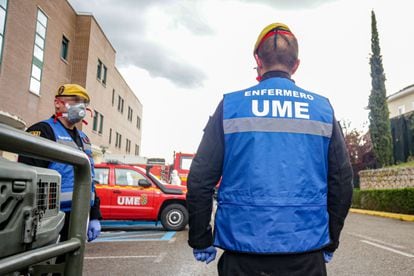Spanish prosecutors launch investigation after bodies found inside senior homes
Workers say protocols prohibit them from touching corpses and complain funerary services are taking 24 hours to show up
/cloudfront-eu-central-1.images.arcpublishing.com/prisa/DVT7D5ENIVC7BKXT7EMCIBWP2I.jpg)
The situation inside Spain’s senior homes, which have been hard hit by the coronavirus epidemic, is even more dramatic than previously thought.
On Monday, Defense Minister Margarita Robles revealed that the army’s Emergency Military Unit (UME), which is providing these centers with medical and cleanup assistance, has found “seniors in a state of complete abandonment, when not directly dead in their beds.”
Workers are putting themselves on the line, without resources, without healthcare support, without protective gearJosé Manuel Ramírez, president of the Association of Social Services Directors and Managers
Late on Monday, public prosecutors announced an investigation into allegations that there are “elderly people, some of them sick, living in extreme conditions and with poor hygiene” at senior residences. Reports of deceased residents will also be investigated, and prosecutors will determine whether there is any criminal liability.
“We are going to be absolutely implacable and forceful about the treatment that seniors are getting in those residences,” said Robles in statements on TV network Telecinco’s magazine show El Programa de Ana Rosa. After asserting that most centers are treating residents adequately, the minister added that “the weight of the law will fall on those who fail to meet their obligations.”
Overwhelmed
But workers at these centers complain that they are being forced to work in dangerous conditions, without proper equipment, that funerary services are showing up late to collect bodies and that protocols prohibit care home staff from touching them in order to prevent further contagion.
José Manuel Ramírez, president of the Association of Social Services Directors and Managers, called the minister’s statements “unfortunate” and “shameful.” “Workers are putting themselves on the line, without resources, without healthcare support, without protective gear,” he said, asking people not to “criminalize” employees who are acting “like heroes and heroines.”
Senior care homes have been at the center of numerous coronavirus outbreaks in Spain, and managers have long been complaining about a lack of human and material resources to deal with the situation.
Dozens of deaths

The Defense Ministry has confirmed that bodies were found at several senior residences. At many of these centers, some staff members had walked out on the job after coronavirus outbreaks were detected.
Last week it emerged that more than 100 elderly people have died at senior homes across the country, although there are no official government figures. The Health Ministry transfers queries to regional governments, and the Madrid region – the hardest hit by the coronavirus pandemic – does not provide numbers, either.
Sources at the public agency Imserso, which is in charge of senior and social affairs, said that there may be isolated cases of overwhelmed senior centers, but insisted that most residences are functioning adequately despite a shortage of equipment and personnel, given that many workers have fallen ill themselves or have been quarantined.
Last weekend the army’s UME unit began rendering assistance to overburdened senior homes. The government said that any center that is unable to provide proper care has the obligation to inform regional and central authorities so that the UME can be dispatched to help with disinfection and other duties.
Following protocol
Healthcare sources said that bodies of deceased residents are normally taken to a refrigerated room where they remain in storage until they are collected by funerary services. When the death is thought to be caused by Covid-19, however, protocols prohibit workers from touching the body until funerary personnel show up with protective gear.
But the current overwhelming demand at Madrid’s funerary services means that up to 24 hours are elapsing between the time of death and the time of collection.
Two workers at a residence in the Madrid district of Usera told EL PAÍS that the UME walked in on Sunday morning to disinfect the premises, and found the body of a man who had died the day before. The corpse was still lying in bed in the man’s room. “He was there from early afternoon [on Saturday]. I arrived at night, and at 8am the next morning he was still there,” said José Manuel Martín-Lopi, who works the front desk at the senior home.
A nursing assistant who spoke on condition of anonymity said the body was collected at around 11.30am on Sunday. “Normally the process takes two hours, what with the paperwork and informing the family. In this case it wasn’t so,” said Martín-Lopi. A center spokeswoman said that the body could not be moved because it was thought it could be a source of contagion, and that protocol establishes that they had to wait for the funerary services.
On Monday, the UME also began transferring coronavirus victims from Madrid hospitals to a makeshift morgue that’s been set up at the Palacio del Hielo ice rink, the Defense Ministry has confirmed.
English version by Susana Urra.
/cloudfront-eu-central-1.images.arcpublishing.com/prisa/JWP7VHCNAND5ZO62RJHR63JHN4.JPG)
/cloudfront-eu-central-1.images.arcpublishing.com/prisa/PNVUTDETUNEKVEOYP4MVEOXSSU.jpg)










































